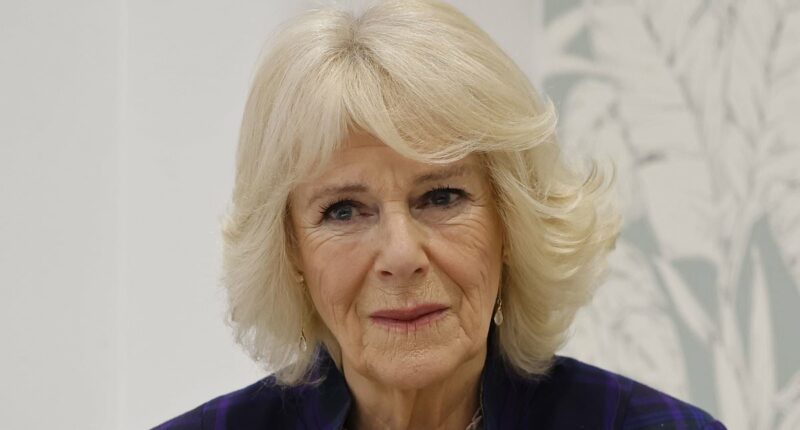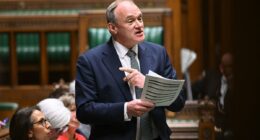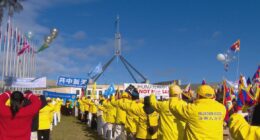Share this @internewscast.com
Queen Camilla was assaulted as a teenager and fought off her attacker with a shoe, a new royal book has claimed.
The royal is said to have been on a train to Paddington as a 16 or 17-year-old schoolgirl when a man attempted to touch her.
The information comes from an upcoming book by former royal correspondent Valentine Low, named “Power and the Palace: The Inside Story of the Monarchy and 10 Downing Street,” which has been serialized in The Times.
Reportedly, Camilla shared her experience with Boris Johnson back in 2008 during his visit to Clarence House as the newly elected Mayor of London.
She is said to have told Mr Johnson that ‘some guy was moving his hand further and further’.
In recounting the incident, the former Duchess of Cornwall is said to have followed her mother’s advice by defending herself with a high heel shoe during the attack.
The Mail understands that while she has never sought to make her own experience public, the Queen is pragmatic it has now been reported publicly.
A source close to Camilla mentioned, “If discussing her experience can help other women, then she views that as a positive result.”
Friends say the incident is something she has never hidden from family and friends.
Camilla has reportedly also spoken about her experience in private with individuals and organizations she has collaborated with over the past ten years in the areas of sexual assault and domestic violence.

Queen Camilla attended the Service of Remembrance to commemorate the 80th Anniversary of VJ Day at the National Memorial Arboretum in Alrewas on August 15.

Queen Camilla is said to have been on a train to Paddington as a 16 or 17-year-old when a man attempted to touch her. Pictured: Camilla (left) when younger
But she has never wanted to equate her experience, however unpleasant and unwarranted, with some of the tragic and heartbreaking stories that other women have bravely chosen to share with her over the years.
‘Her experience, alas, was as familiar to many women then as it is, sadly, today. And clearly, totally unacceptable,’ a source told the Mail.
‘But she has never wanted to equate what she went through as a young woman with the stories that so many victims and survivors have had the courage to share with her over her past decade of campaigning on the issue.
‘This is not because of any sense of shame. It simply happened a very long time ago and she dealt with it. She has always taken the view that other women’s stories are much more important than her own.’
Friends are also at pains to stress that the experience wasn’t responsible for inspiring her public work, which has always very much been about the women who have needed her help.
But they feel it has given her a certain amount of empathy and understanding about some of the experiences they have undergone.
The Queen first visited a crisis centre for victims of rape and sexual assault in Croydon, south London, in 2009 as Duchess of Cornwall.

King Charles and his wife Queen Camilla at Royal Ascot, Day 5, on June 21 this year
She was so moved by the stories she heard and of the Rape and Sexual Abuse Support Centre’s need for practical and financial support that she determined to make the issue a cornerstone of her public work. It is one she has insisted on continuing as Queen.
Over the years she has worked tirelessly to highlight organisations supporting victims of rape and sexual support, meeting survivors and shining a light on the organisations that support them.
In 2013 she held a ground-breaking reception in London, bringing together national stakeholders and key decision-makers in the field. It was the first time in the UK that such a wide range of organisation had been drawn together to specifically discuss rape and sexual abuse.
That same year she started her ‘washbags’ project to provide victims with toiletries such as shampoo, shower gel and toothbrush’s to use after undergoing gruelling forensic examinations in the aftermath of an assault.
Camilla said she wanted to offer them a touch of comfort and normality at such a traumatic time in their lives.
She has also visited many centres worldwide in countries as diverse as the USA, India, and the Balkans.
Recently she became patron of the Mirabel Centre in Nigeria, the country’s first sexual assault referral centre.
The Queen is also closely associated with several organisations in the UK – including Safe Lives and WOW! – both of which campaign in the field.
In 2021 she gave a speech about the stigma and shame that survivors often face, saying: ‘Rapists are not born, they are constructed. And it takes an entire community – male and female – to dismantle the lies, words and actions that foster a culture in which sexual assault is seen as normal, and in which it shames the victim.’
Over the years Camilla has also expanded her work to help the victims and survivors of domestic abuse.
In November last year, an ITV documentary followed the Queen’s campaign work – including a poignant moment where she sat at a small table in a women’s refuge talking with a domestic abuse survivor.
‘I’m probably just as nervous as you,’ she tells Natalie, whose identity has been protected.
She then listens intently to the survivor’s heartbreaking story about how her ‘funny and charming’ partner turned into an abusive monster who would beat her ‘sometimes for days’.
In the film, the Queen said domestic abuse should not be a taboo subject, and called for it to be talked about more openly.

















